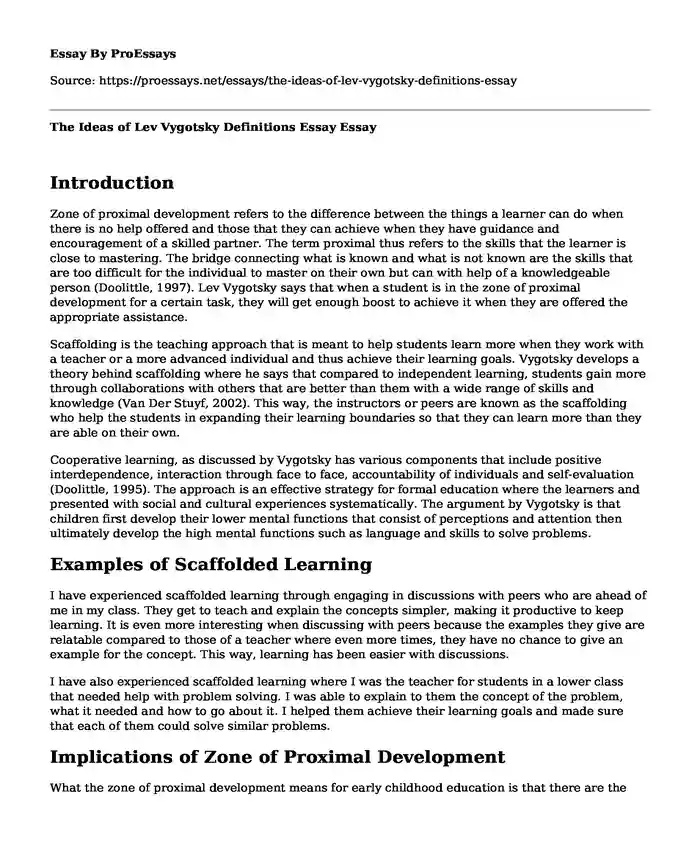Introduction
Zone of proximal development refers to the difference between the things a learner can do when there is no help offered and those that they can achieve when they have guidance and encouragement of a skilled partner. The term proximal thus refers to the skills that the learner is close to mastering. The bridge connecting what is known and what is not known are the skills that are too difficult for the individual to master on their own but can with help of a knowledgeable person (Doolittle, 1997). Lev Vygotsky says that when a student is in the zone of proximal development for a certain task, they will get enough boost to achieve it when they are offered the appropriate assistance.
Scaffolding is the teaching approach that is meant to help students learn more when they work with a teacher or a more advanced individual and thus achieve their learning goals. Vygotsky develops a theory behind scaffolding where he says that compared to independent learning, students gain more through collaborations with others that are better than them with a wide range of skills and knowledge (Van Der Stuyf, 2002). This way, the instructors or peers are known as the scaffolding who help the students in expanding their learning boundaries so that they can learn more than they are able on their own.
Cooperative learning, as discussed by Vygotsky has various components that include positive interdependence, interaction through face to face, accountability of individuals and self-evaluation (Doolittle, 1995). The approach is an effective strategy for formal education where the learners and presented with social and cultural experiences systematically. The argument by Vygotsky is that children first develop their lower mental functions that consist of perceptions and attention then ultimately develop the high mental functions such as language and skills to solve problems.
Examples of Scaffolded Learning
I have experienced scaffolded learning through engaging in discussions with peers who are ahead of me in my class. They get to teach and explain the concepts simpler, making it productive to keep learning. It is even more interesting when discussing with peers because the examples they give are relatable compared to those of a teacher where even more times, they have no chance to give an example for the concept. This way, learning has been easier with discussions.
I have also experienced scaffolded learning where I was the teacher for students in a lower class that needed help with problem solving. I was able to explain to them the concept of the problem, what it needed and how to go about it. I helped them achieve their learning goals and made sure that each of them could solve similar problems.
Implications of Zone of Proximal Development
What the zone of proximal development means for early childhood education is that there are the basic skills that one has but there are also others that they need though they cannot have them because they need a teacher to help them. The younger students are learning new skills and concepts that they have not yet been exposed to before hence the need for an advanced individual. Learning experiences should be structured to reveal that the learning pattern as it goes to more complex matters. The environment should be designed to make the student feel comfortable while learning. Teachers can encourage cooperative learning by allowing students to evaluate themselves after reading.
References
Doolittle, P. E. (1995). Understanding Cooperative Learning through Vygotsky's Zone of Proximal Development.
Doolittle, P. E. (1997). Vygotsky's Zone of Proximal Development as a Theoretical Foundation for Cooperative Learning. Journal on Excellence in College Teaching, 8(1), 83-103.
Van Der Stuyf, R. R. (2002). Scaffolding as a teaching strategy. Adolescent learning and development, 52(3), 5-18.
Cite this page
The Ideas of Lev Vygotsky Definitions Essay. (2024, Jan 10). Retrieved from https://proessays.net/essays/the-ideas-of-lev-vygotsky-definitions-essay
If you are the original author of this essay and no longer wish to have it published on the ProEssays website, please click below to request its removal:
- Restrictive Eating Behaviors Are a Non-Weight-Based Marker of Severity in Anorexia Nervosa
- Self-Reflection: Introduction to Management Paper Example
- Essay Sample on The Ancient City of Karnak/Al-Karnak: Myth, Beliefs and History
- Essay Example on Gaining English Skills and Knowledge: From Interest to Success
- Unlocking Language Acquisition: The Behaviorist Theory and Its Complements - Essay Sample
- Essay on Vladimir Lenin: Revolutionary Leader of Soviet Union and Russia (1870-1924)
- Essay Example on Pacification in USA Military History: A Three-Part Approach







